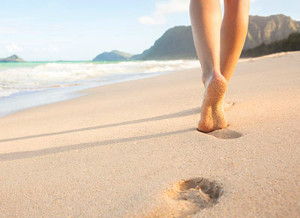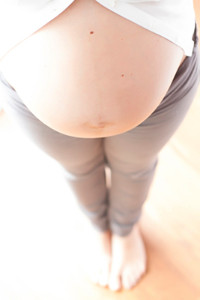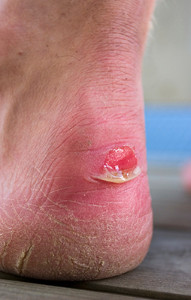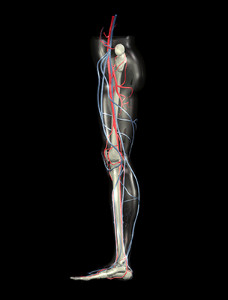 Traveling can be exciting, but nothing can ruin a trip like foot pain. And that’s not all that you need to watch out for when jet setting. Sitting in a small airplane seat, especially on a long flight, can lead to cramping and discomfort. In order to avoid this, try to walk the aisles as much as you can and stretch frequently. Drinking plenty of water and doing your best to avoid alcohol is also a good tip to avoid the aches and pains of a flight. When you land, there’s a good chance that you’ll be doing some walking. Be sure to wear comfortable shoes to avoid blisters and swelling. Remember, you can’t take a vacation from your feet.
Traveling can be exciting, but nothing can ruin a trip like foot pain. And that’s not all that you need to watch out for when jet setting. Sitting in a small airplane seat, especially on a long flight, can lead to cramping and discomfort. In order to avoid this, try to walk the aisles as much as you can and stretch frequently. Drinking plenty of water and doing your best to avoid alcohol is also a good tip to avoid the aches and pains of a flight. When you land, there’s a good chance that you’ll be doing some walking. Be sure to wear comfortable shoes to avoid blisters and swelling. Remember, you can’t take a vacation from your feet.
Everyday foot care is very important to prevent infection and other foot ailments. If you need your feet checked, contact Brent Harwood, DPM from Southeast Podiatry. Our doctor can provide the care you need to keep you pain-free and on your feet.
Everyday Foot Care
Often, people take care of their bodies, face and hair more so than they do for their feet. But the feet are a very important aspect of our bodies, and one that we should pay more attention to. Without our feet, we would not be able to perform most daily tasks.
It is best to check your feet regularly to make sure there are no new bruises or cuts that you may not have noticed before. For dry feet, moisturizer can easily be a remedy and can be applied as often as necessary to the affected areas. Wearing shoes that fit well can also help you maintain good foot health, as well as making it easier to walk and do daily activities without the stress or pain of ill-fitting shoes, high heels, or even flip flops. Wearing clean socks with closed shoes is important to ensure that sweat and bacteria do not accumulate within the shoe. Clean socks help to prevent Athlete’s foot, fungi problems, bad odors, and can absorb sweat.
If you have any questions please feel free to contact one of our offices located in Fairhope, Brewton, and Atmore, AL . We offer the newest diagnostic and treatment technologies for all your foot care needs.
Read more about Every Day Foot Care Pregnancy can create additional pressure on the feet, making certain everyday activities and responsibilities difficult for women. Women who work desk jobs should ensure that they’re sitting in chairs that offer optimal support, while women who spend a majority of their time standing should occasionally elevate their feet using a foot rest. Wearing comfortable shoes is also a must and should never be overlooked. Elevating the feet can also help pregnant women in managing edema, as the feet often swell during pregnancy.
Pregnancy can create additional pressure on the feet, making certain everyday activities and responsibilities difficult for women. Women who work desk jobs should ensure that they’re sitting in chairs that offer optimal support, while women who spend a majority of their time standing should occasionally elevate their feet using a foot rest. Wearing comfortable shoes is also a must and should never be overlooked. Elevating the feet can also help pregnant women in managing edema, as the feet often swell during pregnancy.
Pregnant women with swollen feet can be treated with a variety of different methods that are readily available. For more information about other cures for swollen feet during pregnancy, consult with Brent Harwood, DPM from Southeast Podiatry. Our doctor will attend to all of your foot care needs.
What Foot Problems Can Arise During Pregnancy?
One problem that can occur is overpronation, which occurs when the arch of the foot flattens and tends to roll inward. This can cause pain and discomfort in your heels while you’re walking or even just standing up, trying to support your baby.
Another problem is edema, or swelling in the extremities. This often affects the feet during pregnancy but tends to occur in the later stages.
How Can I Keep My Feet Healthy During Pregnancy?
If you have any questions please feel free to contact one of our offices located in Fairhope, Brewton, and Atmore, AL . We offer the newest diagnostic and treatment technologies for all your foot care needs.
Read more about Pregnancy and Foot Health Those who spend a large amount of time putting pressure on their feet are prone to developing blisters, or pockets of fluid between layers of skin which develop due to friction. Minor blisters should not be popped, and instead left alone and covered to provide cushioning and avoid further friction. Prevent the development of blisters by wearing proper-fitting shoes and socks that provide ample comfort and support. Be sure to treat blisters immediately after discovery to avoid pain and disruption of daily activities. If a blister ruptures, immediately disinfect the area and treat it with antibiotic ointment. Consult with a doctor if the pain persists or there is any sign of infection.
Those who spend a large amount of time putting pressure on their feet are prone to developing blisters, or pockets of fluid between layers of skin which develop due to friction. Minor blisters should not be popped, and instead left alone and covered to provide cushioning and avoid further friction. Prevent the development of blisters by wearing proper-fitting shoes and socks that provide ample comfort and support. Be sure to treat blisters immediately after discovery to avoid pain and disruption of daily activities. If a blister ruptures, immediately disinfect the area and treat it with antibiotic ointment. Consult with a doctor if the pain persists or there is any sign of infection.
Blisters are prone to making everyday activities extremely uncomfortable. If your feet are hurting, contact Brent Harwood, DPM of Southeast Podiatry. Our doctor can provide the care you need to keep you pain-free and on your feet.
Foot Blisters
Foot blisters develop as a result of constantly wearing tight or ill-fitting footwear. This happens due to the constant rubbing from the shoe, which can often lead to pain.
What Are Foot Blisters?
A foot blister is a small fluid-filled pocket that forms on the upper-most layer of the skin. Blisters are filled with clear fluid and can lead to blood drainage or pus if the area becomes infected.
How Do Blisters Form?
Blisters on the feet are often the result of constant friction of skin and material, usually by shoe rubbing. Walking in sandals, boots, or shoes that don’t fit properly for long periods of time can result in a blister. Having consistent foot moisture and humidity can easily lead to blister formation.
Prevention & Treatment
It is important to properly care for the affected area in order to prevent infection and ease the pain. Do not lance the blister and use a Band-Aid to provide pain relief. Also, be sure to keep your feet dry and wear proper fitting shoes. If you see blood or pus in a blister, seek assistance from a podiatrist.
If you have any questions, please feel free to contact one of our offices located in Fairhope, Brewton, and Atmore, AL . We offer the newest diagnostic and treatment technologies for all your foot care needs.
Read more about Blisters on the Feet If your feet feel cold, especially during these winter months, it is because it is your body’s natural response for conserving heat when it is too cold. Your body “tries to maintain its internal temperature by constricting small blood vessels under the surface of the skin. This allows more blood to move deeper in the body, so your core stays warm.” However, this causes your body’s extremities, like the feet, to receive poor blood circulation. When taking care of your cold feet, try to wear warm, breathable socks that help wick away moisture. Opt for wool in place of cotton. Other methods include warming your feet up in warm water, drinking hot liquids, moving around to get your blood circulation going, and investing in shoe inserts to help insulate the insides of your shoes.
If your feet feel cold, especially during these winter months, it is because it is your body’s natural response for conserving heat when it is too cold. Your body “tries to maintain its internal temperature by constricting small blood vessels under the surface of the skin. This allows more blood to move deeper in the body, so your core stays warm.” However, this causes your body’s extremities, like the feet, to receive poor blood circulation. When taking care of your cold feet, try to wear warm, breathable socks that help wick away moisture. Opt for wool in place of cotton. Other methods include warming your feet up in warm water, drinking hot liquids, moving around to get your blood circulation going, and investing in shoe inserts to help insulate the insides of your shoes.
Poor circulation is a serious condition and needs immediate medical attention. If you have any concerns with poor circulation in your feet contact Brent Harwood, DPM of Southeast Podiatry. Our doctor will treat your foot care needs.
Poor Circulation in the Feet
Poor blood circulation in the feet and legs is can be caused by peripheral artery disease (PAD), which is the result of a buildup of plaque in the arteries.
Plaque buildup or atherosclerosis results from excess calcium and cholesterol in the bloodstream. This can restrict the amount of blood which can flow through the arteries. Poor blood circulation in the feet and legs are sometimes caused by inflammation in the blood vessels, known as vasculitis.
Causes
Lack of oxygen and oxygen from poor blood circulation restricts muscle growth and development. It can also cause:
Those who have diabetes or smoke are at greatest risk for poor circulation, as are those who are over 50. If you have poor circulation in the feet and legs it may be caused by PAD and is important to make changes to your lifestyle in order to reduce risk of getting a heart attack or stroke. Exercise and maintaining a healthy lifestyle will dramatically improve conditions.
As always, see a podiatrist as he or she will assist in finding a regimen that suits you. A podiatrist can also prescribe you any needed medication.
If you have any questions please feel free to contact one of our offices located in Fairhope, Brewton, and Atmore, AL . We offer the newest diagnostic and treatment technologies for all your foot care needs.
Read more about Causes, Symptoms, and Treatment of Poor Blood Circulation in the Feet